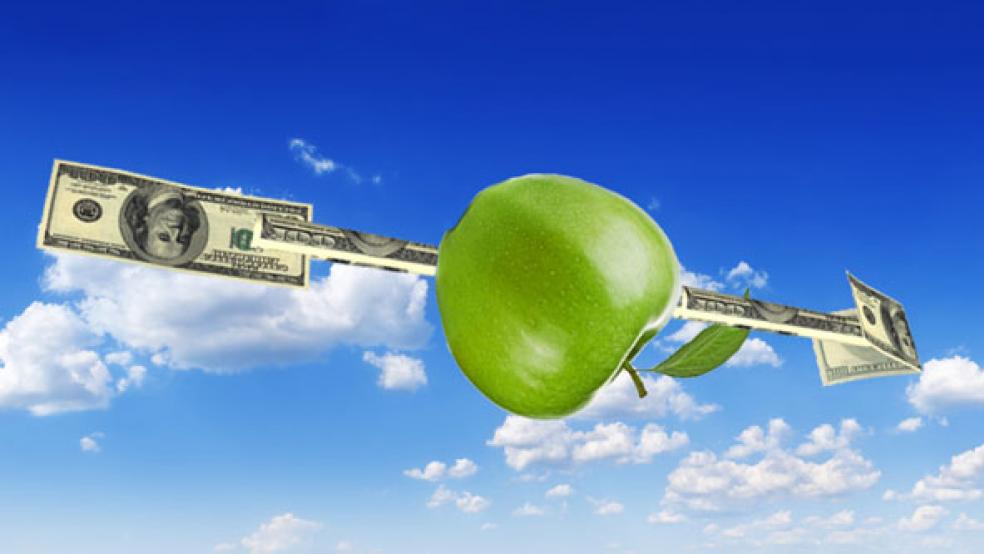What’s happening with Apple (NASDAQ: AAPL) right now – the general visceral aversion to the company’s shares – is almost irrational enough to end up in the next edition of the medical textbook used to diagnose mental illnesses.
Why? Well, let’s talk numbers first. Apple announced Wednesday afternoon that it had sold a record 47.8 million iPhones in the fourth quarter of 2012, up 29 percent from 37 million in the same period a year earlier. Sales of the iPad tablet rose 48 percent over the year-ago period to hit a record 22.9 million devices.
Impressive, no? Well, not if you are an Apple worrywart. Those folks are brooding over how many new iPhone buyers are out there. How many people are willing to keep paying up to replace their iPhone with the latest version of the device? Estimates are that at least half of Americans now own a smartphone of one kind or another, and odds are that if you really want an iPhone, you have one. How many times do you want to upgrade the device? And do consumers continue to see the changes as upgrades (especially after the doomed Apple Maps app)? Or are they likely to switch to another device?
Apple may have won the battle with Samsung over patents, but the outcome of the war itself – which smartphone manufacturer will dominate, or whether a more competitive smartphone universe will drive Apple’s margins lower – remains unclear. On the one hand, Verizon announced it activated more than six million iPhones in the fourth quarter. On the other, only about half of those were the newest model and thus sold at the highest margins.
Apple bears also worry about the possibility that the new iPad mini – sold at a lower margin – will cannibalize sales of the traditional iPad. And they are concerned that Amazon’s new range of Kindle Fire tablets – ultra cheap devices, relatively – will nibble away at the iPad market share from another direction.
There are some genuine concerns here. Consumers generally have shown that they are very price conscious. Apple’s newest products don’t get offered up at a discount. As more and more Americans end up owning smartphones, the rate of growth will slow; those that have yet to hop aboard the smartphone bandwagon may well have been deterred by the price, and be more willing to buy older and less pricey models and less anxious to upgrade constantly.
Those are all valid fears, but they’re not enough reason to embark on the kind of panicky selling that sent Apple’s shares plunging almost 10 percent in the wake of the earnings announcement.
By many measures, Apple now looks cheap. Its shares now trade at 11.64 times trailing 12-month earnings. While revenue growth fell short of expectations, it still jumped 18 percent at a time when revenue growth is even harder to find, with many S&P companies eking out higher profits only by squeezing costs.
The S&P 500 index trades at an average of about 14.5 times trailing earnings. This quarter, the S&P 500 is expected to see a modest – very modest – increase in profits, while Apple eked out only a 0.1 percent increase in profits. Those Apple profits looked smaller on a per share basis, because there has been some dilution.
It’s not good news that Apple’s earnings per share have dipped for the first time since 2003, but it’s equally absurd to react in this way to a slightly disappointing earnings release by a company sitting on some $137 billion in cash. Strip out that cash and Apple is trading at 7 to 8 times earnings – the kind of valuation you’d expect to see for a company in active distress, or one whose business model is facing major headwinds. In Apple’s case, it’s simply a matter of question marks hanging overhead.
The recent memorable gains in Apple’s share price may be part of the problem. When the stock hit $705 a share, that was probably an example of irrational exuberance at work. But the current price may be irrational pessimism. These valuations don’t make sense.
Apple has growth potential – simply not the same explosive growth potential of recent years. That’s not to suggest that under new CEO Tim Cook it can’t find another string of new and innovative products, or take other steps to make itself alluring once more. It has a track record of developing category-killing products and making them speedily and efficiently, and there is no reason to believe that ability died along with Steve Jobs.
Apple also has all that cash. During the earnings conference call, chief financial officer Peter Oppenheimer said Apple continually ponders the idea of stock buybacks. Should it decide to return cash to investors that way, or by raising the dividend, the company would instantly become even more attractive to yield-hungry investors in quest of a call option on growth.
Is this the time to go out on a limb and snap up the stock? Not if you keep an eye on momentum or market psychology, both of which suggest that it would be a very, very bad decision. Investors seem to want to remain bearish about Apple; to view the cup as half empty. Apple has an image problem. At some point, something will come along to change that, but the catalyst isn’t in sight today. Plus, as Birinyi Associates cautioned in a report to clients earlier today, regardless of the immediate response by Apple’s stock to the earnings announcement, the day after sees Apple trader lower more than two-thirds of the time.
Right now, owning Apple is about playing a waiting game, and it’s not one for the faint of heart.





